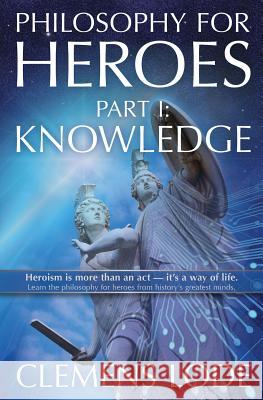Philosophy for Heroes: Part I: Knowledge » książka
Philosophy for Heroes: Part I: Knowledge
ISBN-13: 9783945586211 / Angielski / Miękka / 2016 / 238 str.
We are each heroes in the making. How can this be? Because we can reflect on our actions. We have the potential to become heroes in every aspect and every action of our lives... Being a hero is much more than committing a heroic act. One does not magically morph into a "hero" as a result of circumstance: the just-in-time rescue, rising up in the midst of a crisis, or even leading others out of a catastrophe. Becoming a hero is more than even these courageous acts. It requires deep insight-the type of philosophical investigation that the greatest minds throughout history have pondered. With his book series Philosophy for Heroes, Clemens Lode bridges the gap between coding, science, philosophy, and, ultimately, leadership. In Philosophy for Heroes: Knowledge, he takes the reader on a journey, examining the foundations of knowledge. What is the basis of our understanding of the world? How does society define a "hero"? How do basic skills, such as language and mathematics, train our way of thinking and reasoning? Becoming a hero requires more than courage. It requires speaking up, stepping forward from the sidelines, and taking action. For all of this, a deep insight into philosophy is the first, and most important, step. Philosophy for Heroes connects the wisdom of the ages to today's real world. Table of Contents 1 My Philosophy 1.1 Heroism 1.1.1 The Conventional Hero 1.1.2 Heroes and Conflicts 1.2 The Key to Wisdom 1.3 Why Philosophy Is Important 1.4 Basics of Philosophy 1.5 Ontology 1.5.1 The Fallacy of the Stolen Concept 1.5.2 The Axiom of Existence 1.5.3 The Axiom of Identity 1.5.4 The Axiom of Consciousness 1.6 Epistemology 1.6.1 Perception 1.6.1.1 The Limits of Perception 1.6.1.2 The Range of Perception 1.6.2 Concepts 1.6.2.1 Concept Formation 1.6.2.2 Establishment of a Definition 1.6.2.3 Concept Hierarchies 1.6.2.4 Conceptual Common Denominator 1.6.2.5 Boundary Cases 1.6.2.6 Concepts in Computers 1.6.3 Induction and Deduction 1.6.4 Rationalism 1.6.5 Induction and Empiricism 1.6.5.1 A World Without Induction 1.6.5.2 The Problem of Induction 1.6.5.3 The Truth 2 Language 2.1 Properties of Language 2.1.1 The Origin of Writing 2.1.2 Completeness and Consistency 2.1.2.1 Incomplete Languages 2.1.2.2 Inconsistent Languages 2.1.3 Language Optimization 2.1.4 Learning of Languages 2.2 Language and Mathematics 2.2.1 Sets 2.2.1.1 Set of all Sets 2.2.1.2 Countable Sets 2.2.2 Ratios 2.2.3 Irrational Numbers 2.2.4 Mathematics and Empiricism 2.2.5 The Zero 2.2.6 Mathematics and Reality 2.3 The Value of Language 2.3.1 The Foundation of Knowledge 2.3.2 The Theory of Mind 2.3.3 Language as Communication 2.3.3.1 Differences in Concepts 2.3.3.2 Cultural Differences 2.3.3.3 Translatability 2.3.3.4 Other Forms of Intelligence 2.3.3.5 The Arecibo Message 2.3.3.6 Trust 2.3.3.7 Language in Society











